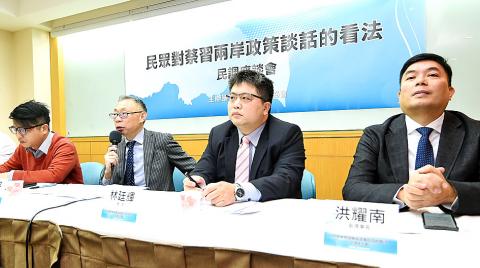More than 80 percent of Taiwanese do not accept the “one country, two systems” formula and a majority reject the existence of the so-called “1992 consensus,” a survey published yesterday by the Cross-Strait Policy Association found.
Asked whether they supported Chinese President Xi Jinping’s (習近平) proposal of a “one country, two systems” model for unification, which would make Taiwan a local government and eliminate the Republic of China (ROC), 80.9 percent answered “no” and 13.7 percent said “yes.”
Even among respondents who identify with the pan-blue camp, the majority — 64.7 percent of Chinese Nationalist Party (KMT) supporters and 63 percent of People First Party supporters — rejected the formula, the survey found.

Photo: Chu Pei-hsiung, Taipei Times
In addition, 68.5 percent did not think Beijing’s “one China” principle has room for the ROC, versus 25.5 percent who believed it does.
As for the “1992 consensus,” 55.7 percent of respondents did not think it exists, while 34.1 percent thought otherwise, with pan-blue supporters generally believing in its existence, the poll showed.
The “1992 consensus” — a term former Mainland Affairs Council chairman Su Chi (蘇起) in 2006 admitted making up in 2000 — refers to a tacit understanding between the KMT and the Chinese Communist Party that both sides acknowledge there is “one China,” with each side having its own interpretation of what “China” means.
However, Xi in a speech in Beijing on Wednesday last week said that it means “both sides of the [Taiwan] Strait belong to ‘one China’ and will work jointly to seek national unification.”
Seventy-eight percent of respondents agreed with President Tsai Ing-wen’s (蔡英文) stance that cross-strait political negotiations need a mandate from the people, should be subject to public scrutiny and must be carried out by the governments on both sides of the Strait.
Tsai was responding to Xi’s expression of willingness to engage in dialogue on unification and cross-strait political issues with all political parties, groups and individuals from Taiwan on the basis of the “one China” principle.
Tsai’s “four musts” and calls for setting up of a three-part security network for cross-strait exchanges in her New Year’s address received overwhelming public support, garnering support from 85.2 percent and 87.3 percent of respondents respectively, the poll showed.
The “four musts” state that China must recognize the existence of the ROC; must respect the values of democracy and freedom that Taiwan’s 23 million people hold dear; must resolve cross-strait differences in a peaceful and equitable manner; and must engage in negotiations with the government of Taiwan or an institution with a government mandate.
The three-part security network includes parts to strengthen security of people’s livelihoods, enhance information security and improve security protecting democracy in cross-strait interactions.
Asked if they were satisfied with Tsai’s overall response to Xi’s speech, 61.6 percent answered “yes,” while 28.2 percent said “no.”
The poll, conducted on Saturday and Sunday, collected 1,047 valid samples, and has a confidence level of 95 percent and a margin of error of 2.99 percentage points.

Right-wing political scientist Laura Fernandez on Sunday won Costa Rica’s presidential election by a landslide, after promising to crack down on rising violence linked to the cocaine trade. Fernandez’s nearest rival, economist Alvaro Ramos, conceded defeat as results showed the ruling party far exceeding the threshold of 40 percent needed to avoid a runoff. With 94 percent of polling stations counted, the political heir of outgoing Costa Rican President Rodrigo Chaves had captured 48.3 percent of the vote compared with Ramos’ 33.4 percent, the Supreme Electoral Tribunal said. As soon as the first results were announced, members of Fernandez’s Sovereign People’s Party

MORE RESPONSIBILITY: Draftees would be expected to fight alongside professional soldiers, likely requiring the transformation of some training brigades into combat units The armed forces are to start incorporating new conscripts into combined arms brigades this year to enhance combat readiness, the Executive Yuan’s latest policy report said. The new policy would affect Taiwanese men entering the military for their compulsory service, which was extended to one year under reforms by then-president Tsai Ing-wen (蔡英文) in 2022. The conscripts would be trained to operate machine guns, uncrewed aerial vehicles, anti-tank guided missile launchers and Stinger air defense systems, the report said, adding that the basic training would be lengthened to eight weeks. After basic training, conscripts would be sorted into infantry battalions that would take

GROWING AMBITIONS: The scale and tempo of the operations show that the Strait has become the core theater for China to expand its security interests, the report said Chinese military aircraft incursions around Taiwan have surged nearly 15-fold over the past five years, according to a report released yesterday by the Democratic Progressive Party’s (DPP) Department of China Affairs. Sorties in the Taiwan Strait were previously irregular, totaling 380 in 2020, but have since evolved into routine operations, the report showed. “This demonstrates that the Taiwan Strait has become both the starting point and testing ground for Beijing’s expansionist ambitions,” it said. Driven by military expansionism, China is systematically pursuing actions aimed at altering the regional “status quo,” the department said, adding that Taiwan represents the most critical link in China’s

EMERGING FIELDS: The Chinese president said that the two countries would explore cooperation in green technology, the digital economy and artificial intelligence Chinese President Xi Jinping (習近平) yesterday called for an “equal and orderly multipolar world” in the face of “unilateral bullying,” in an apparent jab at the US. Xi was speaking during talks in Beijing with Uruguayan President Yamandu Orsi, the first South American leader to visit China since US special forces captured then-Venezuelan president Nicolas Maduro last month — an operation that Beijing condemned as a violation of sovereignty. Orsi follows a slew of leaders to have visited China seeking to boost ties with the world’s second-largest economy to hedge against US President Donald Trump’s increasingly unpredictable administration. “The international situation is fraught